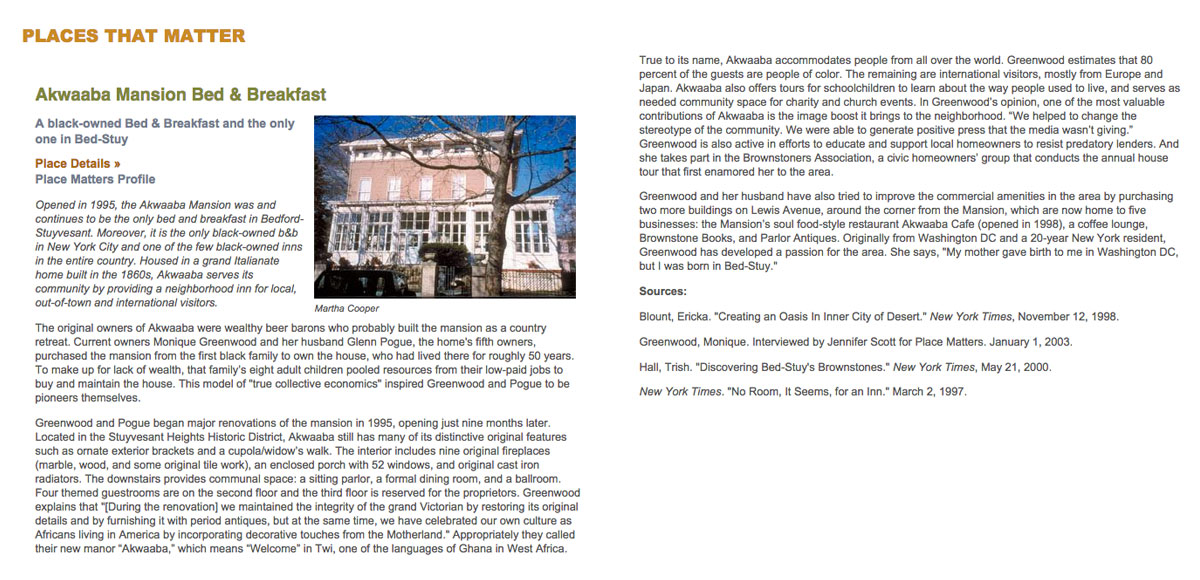Project Description
Akwaaba Mansion on PlacesMatter.net
Opened in 1995, the Akwaaba Mansion was and continues to be the only bed and breakfast in Bedford-Stuyvesant. Moreover, it is the only black-owned b&b in New York City and one of the few black-owned inns in the entire country. Housed in a grand Italianate home built in the 1860s, Akwaaba serves its community by providing a neighborhood inn for local, out-of-town and international visitors.
The original owners of Akwaaba were wealthy beer barons who probably built the mansion as a country retreat. Current owners Monique Greenwood and her husband Glenn Pogue, the home’s fifth owners, purchased the mansion from the first black family to own the house, who had lived there for roughly 50 years. To make up for lack of wealth, that family’s eight adult children pooled resources from their low-paid jobs to buy and maintain the house. This model of “true collective economics” inspired Greenwood and Pogue to be pioneers themselves.
Greenwood and Pogue began major renovations of the mansion in 1995, opening just nine months later. Located in the Stuyvesant Heights Historic District, Akwaaba still has many of its distinctive original features such as ornate exterior brackets and a cupola/widow’s walk. The interior includes nine original fireplaces (marble, wood, and some original tile work), an enclosed porch with 52 windows, and original cast iron radiators. The downstairs provides communal space: a sitting parlor, a formal dining room, and a ballroom. Four themed guestrooms are on the second floor and the third floor is reserved for the proprietors. Greenwood explains that “[During the renovation] we maintained the integrity of the grand Victorian by restoring its original details and by furnishing it with period antiques, but at the same time, we have celebrated our own culture as Africans living in America by incorporating decorative touches from the Motherland.” Appropriately they called their new manor “Akwaaba,” which means “Welcome” in Twi, one of the languages of Ghana in West Africa.
True to its name, Akwaaba accommodates people from all over the world. Greenwood estimates that 80 percent of the guests are people of color. The remaining are international visitors, mostly from Europe and Japan. Akwaaba also offers tours for schoolchildren to learn about the way people used to live, and serves as needed community space for charity and church events. In Greenwood’s opinion, one of the most valuable contributions of Akwaaba is the image boost it brings to the neighborhood. “We helped to change the stereotype of the community. We were able to generate positive press that the media wasn’t giving.” Greenwood is also active in efforts to educate and support local homeowners to resist predatory lenders. And she takes part in the Brownstoners Association, a civic homeowners’ group that conducts the annual house tour that first enamored her to the area.
Greenwood and her husband have also tried to improve the commercial amenities in the area by purchasing two more buildings on Lewis Avenue, around the corner from the Mansion, which are now home to five businesses: the Mansion’s soul food-style restaurant Akwaaba Cafe (opened in 1998), a coffee lounge, Brownstone Books, and Parlor Antiques. Originally from Washington DC and a 20-year New York resident, Greenwood has developed a passion for the area. She says, “My mother gave birth to me in Washington DC, but I was born in Bed-Stuy.”
Sources:
Blount, Ericka. “Creating an Oasis In Inner City of Desert.” New York Times, November 12, 1998.
Greenwood, Monique. Interviewed by Jennifer Scott for Place Matters. January 1, 2003.
Hall, Trish. “Discovering Bed-Stuy’s Brownstones.” New York Times, May 21, 2000.
New York Times. “No Room, It Seems, for an Inn.” March 2, 1997.
Original Source: http://www.placematters.net/node/985

